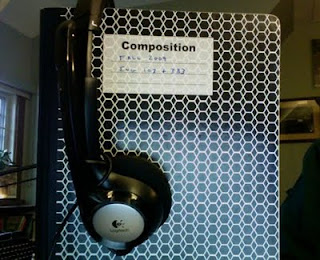
Location: Reading Student Journals (on paper!)
My dear fellow Humanists:
We are doomed in Birkerts’ “Electronic Millennium” unless we adapt to its forms of communication, yet carry with us the Humanities’ irascible and unhip hermeneutics for providing social commentary and critique. Notably, we somehow have to manage this for skim-the-surface students who live in an eternal now of consumerist bliss (or unfulfilled desire).
I nail these 9.5 theses to the digital doors at Wittenberg. Since this is a blog, I won’t make it 95, but that rascal Luther had the luxury of a bookish century to support his spleen.
- Get over your fetish for “The Book.” Reading and its habits, not bound volumes, transform our minds. As new forms of communication enhance the reading experience, we should move beyond our walls of books to consider how embedded film, audio, image, and experiential elements enhance new texts. Then we must develop critical methods to teach them. Civilization will not fall if we stop reading Henry James, sad as that would be. It did not end when most educated folk stopped reading Aquinas. If, however, we stop reading thoughtfully, we’re in real trouble.
- Embrace Web. 2.0 in a thoughtful manner. These tools can further the critical method of the technologically adept humanist. I’ve learned that Twitter provides a painless way to post a link, report progress on a project, and share ideas quickly with those who share my interests. Blogs provide my students with the opportunity to practice in public what they do only for me in their paper journals, as they move from private to public (and ever more formal) discourse at their course wiki-sites.
- Refuse the “eternal now” culture and its interruptive technologies. I don’t carry a cell phone. I check mail three times daily so I can focus on the tasks for which I’m paid and evaluated: supporting students, doing research, and teaching well. To what extent do you practice such habits and provide an example to students? They learn, for instance, that I routinely delete e-mails without a subject line 🙂
- Seduce others into seeing The Matrix for what it is. We have many tech users but few who consider their practices critically. Ask students in appropriate assignments to log their uses of a particular networked technology. It reveals much about them. I’ve had fewer writers fret about “those addicted to gaming” when they take a long, hard look at how much time they dedicate to Facebook.
- Practice teche and episteme. Kudos to Tom Boellstorff in Coming of Age in Second Life for reminding me what these words mean, as he notes that academics live in their heads too often and don’t create enough. For me, Techne means making in Second Life and outside it, by writing for a general readership in our local alternative weekly and other non-academic venues.
- Employ “Ordnung” without driving a buggy. Futurist Howard Rheingold found, when doing research for “Look Who’s Talking,” that the Amish have a sophisticated system for deciding which new inventions get sanctioned or prohibited by their bishops. Generally the community use a new tool for a time, and at each step the members ask whether the tool builds community or pulls it apart.
- Dare to reinvent past treasures. Rezzable’s Virtual Tut, my own House of Usher Simulation, and Jane Austen’s (and Seth Grahame-Smith’s) Pride and Prejudice and Zombies point the way to a New Humanities that will move beyond rigor for its own sake to bring playfulness and the ancient sense of “ludus”–school and play–into our classrooms.
- Question to paddlers of tomorrow. Textbook publishers, software companies, and some of our colleagues who are early adopters become overly eager and evangelize us about each wondrous new application that awaits. Like some evangelists, some of these paddlers want our money. Others mean well. I listen and apply theses 1-7 in these cases.
- Watch South Park or write for the Alphaville Herald. We need to take ourselves less seriously and find social commentary in the lowest of places. Humor is the best medicine to prevent sanctimoniousness.
Thesis 9.5? Add your own in the comments section! “Hush up Iggy” does not count.
